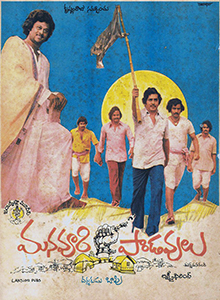

| Manavoori Pandavulu | |
|---|---|

Theatrical poster
| |
| Directed by | Bapu |
| Written by | Mullapudi Venkata Ramana |
| Based on | Paduvaaralli Pandavaru |
| Produced by | Jaya Krishna |
| Starring | Krishnam Raju Chiranjeevi Murali Mohan Rao Gopal Rao |
| Cinematography | Balu Mahendra |
| Music by | K. V. Mahadevan |
Release date |
|
| Country | India |
| Language | Telugu |
Manavoori Pandavulu (transl. Our village's Pandavas) is a 1978 Indian Telugu-language film directed by Bapu and written by Mullapudi Venkata Ramana, dealing with the struggle against the feudal system in their own unique way. The film is remake of Kannada movie Paduvaaralli Pandavaru directed by Puttanna Kanagal. In 1980, he also remade it in HindiasHum Paanch starring Mithun Chakraborty.[1][2]
Film Companion while compiling the 25 Greatest Telugu Films of the Decade, called Rangasthalam as an updated version of this movie.[3]
The film revolves around Krishna (played by Krishnam Raju) who brings together an unlikely group of 5 youngsters to help in creating awareness among their villagers to revolt against the cruel village head, Rambhoopal (Rao Gopal Rao) and his henchmen. Even though being a revolutionary theme, the movie was wonderfully made without the usual noise that accompanies the leftist movies and fashioned on the lines of the great epic Mahabharata. Amazing performances by all the actors (Krishnam Raju, Raogopal Rao, Allu Ramalingaiah etc.) and wonderful technical backup make this movie another classic from Bapu. The film also has Chiranjeevi as a very young actor (his second movie to be released) in the role of Parthu.
Manavoori Pandavulu is the story of five youngsters come together in village to protest against the village chief because village chief is cruel he receive 2x rent from the village farmers there income totally depend on rain, when villagers told that whole past story to the five youngsters the first person who protest against the village chief is Parthu (Chiranjeevi ) the four come together. The village chief tries to kill them but in the end he is vanquished.
All music is composed by K. V. Mahadevan
| No. | Title | Lyrics | Music | Singer(s) | Length |
|---|---|---|---|---|---|
| 1. | "Jendaa Pai Kapiraju" | Arudra | K. V. Mahadevan | S. P. Balasubrahmanyam, G. Anand, M. S. Ramarao | 3:13 |
| 2. | "Manchiki Cheddaki" | Arudra | K. V. Mahadevan | S. P. Balasubrahmanyam | 2:16 |
| 3. | "Nalla Nallani" | Kosaraju | K. V. Mahadevan | G. Anand, S. P. Sailaja | 3:26 |
| 4. | "Orey Pichchi Sannaasee" | Arudra | K. V. Mahadevan | S. P. Balasubrahmanyam | 3:39 |
| 5. | "Pandavulu" | Arudra | K. V. Mahadevan | S. P. Balasubrahmanyam, G. Anand, M. S. Ramarao | 3:33 |
| 6. | "Piriki Mandhu Thaagi" | Arudra | K. V. Mahadevan | S. P. Balasubrahmanyam | 4:08 |
| 7. | "Sitralu Seyaro" | Arudra | K. V. Mahadevan | S. P. Balasubrahmanyam | 3:35 |
| 8. | "Swagatham Suswagatham" | Arudra | K. V. Mahadevan | Rao Gopal Rao, P. Susheela | 4:33 |
| Total length: | 27:23 | ||||
Katakataala Rudraiah and Mana Voori Pandavulu were released within a gap of 10 days and both the films became blockbusters.[4]
|
Filmography of Bapu
| |
|---|---|
| Telugu films |
|
| Hindi films |
|
| Tamil films |
|
|
| |
|---|---|
| Films produced |
|
| Family |
|
| See also |
|